Anodea Judith's Blog, page 7
December 30, 2013
Merry Christmas from Sacred Centers!
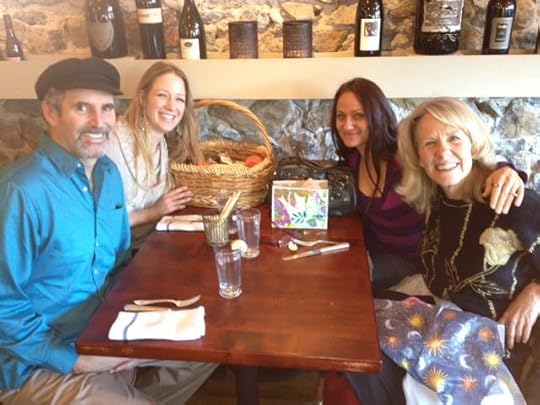 A Very Merry Christmas Wish
from Sacred Centers
Beneath the commercial buzz and the long lines in the stores, Christmas is ultimately about the heart. It’s about generosity and caring, family and sharing, about rebirth and hope and the turning of the wheel toward a new era.
A Very Merry Christmas Wish
from Sacred Centers
Beneath the commercial buzz and the long lines in the stores, Christmas is ultimately about the heart. It’s about generosity and caring, family and sharing, about rebirth and hope and the turning of the wheel toward a new era.Sacred Centers wishes you a fabulous holiday season however you celebrate, and a joyous new year full of miracles. 
Thank you for being part of our mission to change the world one chakra at a time. We hope to see you in the coming year.
Love and light,
Sacred Centers
Anodea Judith
Shanon Dean
Gianna Perada
Nini Gridley
Ramone Yaciuk
The Pivot Point of the Year
We need not fear the darkness but the blinding flash of light.
Darkness and light have been the primal archetypes of consciousness since the beginning of time. The subject of myths and legends the world around, they were once forces over which we were powerless. As it is in the myths, light has triumphed over darkness to the point where darkness and quiet are endangered elements in our civilized world. We even have the term “light pollution,” because in most cities there is too much light to see the stars.
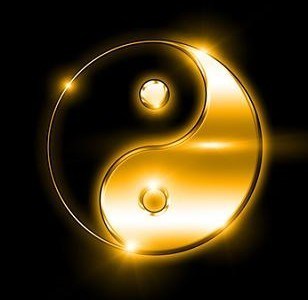
In the endless dance of these archetypal twins, darkness has been given a bad rap, equated with evil, death, and everything negative. The ancients however, saw darkness as the fecundity of the soil, and white as the bleached bones of death. Darkness was a place of rest and renewal, necessary to keep from “burning out” in the season of light. Darkness was the womb from which we emerged, the underworld that holds the roots and seeds of plants. Darkness is the senior partner, the one that gives birth to light.
The darkest point of the year is once again upon us. Now is the time to let go of the past, still our minds, and quiet our souls. Now is the time to open our inner eyes to the blank canvas of darkness and dream in a new world.
We are one year away now from the solstice of 2012, a time many said was a pivot point for humanity. Many changes have occurred. We averted a war with Iran. We have begun, however clumsily, to institute national health care. Gay marriage is legal in 17 states and 16 other countries. Facebook topped a billion users, having increased a thousandfold since it reached 1 million in 2004. We are waking up and more connected than ever.
But the stakes are getting higher. This is also the year that the North Pole melted into a lake, and global warming passed its tipping point. This is the year that Colorado flooded and it snowed in Egypt, and the Philippines experienced the worst storm in history. This is the time when everything we do matters.
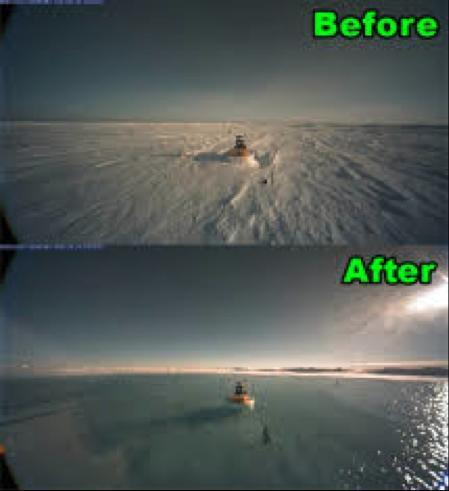 NORTH POLE BEFORE AND AFTER
NORTH POLE BEFORE AND AFTER
Now we are entering the null point between the years. Now is the time to pause, to think carefully about where we are going, to put on the brakes to the highway of mass extinction, to really slow down and consider. For as Rumi says, “We are drunk, and standing on the edge of the roof.”
What can we create together?
Now is the time to dream it. We must reach beyond what we know, anchor into the darkness so that we can sustain ourselves in the light before we burn up everything.
Each of us is called to play a part. Each of us is a cell in the awakening global heart.
We are here to create miracles. We are here to co-create with the divine, and bring heaven back down to earth. But first we must quiet ourselves and listen for the instructions that await us.
Now more than ever, we need the darkness to teach us how to dance in the light.
Happy Solstice!
Anodea Judith
12-19-13
P.S. Here is a preview for workshops coming up next year…
December 7, 2013
In Honor of an Immense Soul
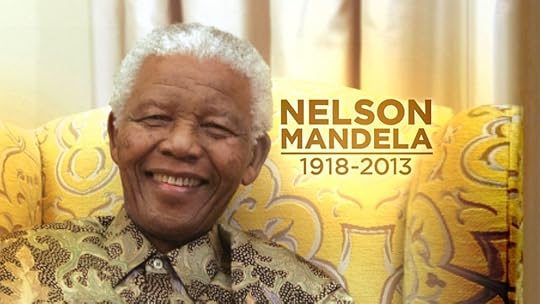 The passing of a great leader calls us to honor what they stood for—a world of equality and justice for all.
The passing of a great leader calls us to honor what they stood for—a world of equality and justice for all.
Nelson Mandela was one of the greatest archetypal heroes of our time. In his 95 years, he traveled both the depths and the heights, from his 27 years of dark imprisonment, to his celebration as the first elected Black President of South Africa, and winner of over 250 awards, including the Nobel Peace Prize in 1993. His accomplishments were an evolutionary milestone for the whole planet.
If you feel small in the face of what needs to happen in the world—if you feel hopeless, like your efforts are in vain—imagine what Mandela must have thought during his original sentence of life imprisonment, living in a damp 8×7-foot cell under maximum security, often under solitary confinement, with one visitor every six months.
Did he lose hope at times? I can only imagine that he must have, yet he never gave up fighting for his dream. Did he have fantasies of revenge? Perhaps there were moments, but instead he worked for reconciliation and forgiveness, even courting those who led the apartheid movement and campaigning for the end of violence. Though he was denied sunglasses when he was forced to work in the lime quarry, he permanently damaged his eyesight, yet never lost his vision of a better world.
Nelson Mandela was a game changer. His shining example encourages us to never lose hope, to never give up, to always keep our vision focused on the loving world we know is possible.
Anodea Judith
12-7-13
November 25, 2013
Thanks for Nothing!
THANKS FOR NOTHING!
The Easiest Way to be Grateful
Don’t get me wrong. I’m eternally grateful for all the blessings that I have: work that I love, a new home to fix up, a loving relationship, to say nothing of living in these amazing times. I hope that I never forget how lucky I am, and how fortunate we all are that we don’t have to labor like our ancestors did, to build the roads and railways to create the infrastructure that we take for granted today. In fact, gratitude is part of my spiritual practice.

But these days, what I find I am most grateful for is those rare moments of nothing. The sweet emptiness of a good meditation, a day off where I can just putter, a moment of stillness in a yoga pose, a blank to-do list (well, frankly that has never happened, but I would be grateful if it did!), a landscape without buildings, a clear sky, or a moment of shared silence with a friend.
We put far too much emphasis on things. We think we need more things, better things, different things. We even see relationships as things, something that we have rather than a living process we are in.
Biologically, men have a thing, and women have a place. Men have created a world filled with the most marvelous things: televisions and computers, houses and automobiles, airplanes, and the internet. Thank you, guys, for all your hard work. (I realize that women contribute to this, too, but it is largely the masculine paradigm that has focused on production.)
But in the process of creating things, the place has gotten trashed. The environment is choked with pollution, and resources are disappearing faster than we can replace them. Temperatures are rising, bringing havoc to every natural and social system we have. The ocean is becoming acid, and the topsoil is disappearing.
We seem to measure our worth in this culture by what we do, many of us feeling guilty when we’re not busy doing something productive. But we may be making an even more important contribution by just being. Driving less, eating less, buying less, doing less, and making more time for simply communing with what is.
On a wonderful call I did recently on the topic of my global heart book, we had a “Conversation Concerto” in which listeners chimed in about the question: “What can we do collectively to address the challenges of transformation that face us?” Over and over again, listeners stated the need for quiet and emptiness as one of the most important things we can do.
We must disengage a clutch in order to change gears. We have let go of what is to open to something new. We have to be quiet to listen to guidance. Quieting down aligns with this time of year, when the green growing things are resting, settling their seeds underground for a winter’s rest.
So this holiday weekend, treasure your moments of nothing. Treasure the shared silence of gratitude before your big meal. Treasure the belly that isn’t overly full. Treasure the day off that allows you to visit with friends or family. Take a deep breath and remember to love both the things and the place.
Happy Thanksgiving!
Anodea Judith
11-25-13
November 13, 2013
What’s Love Got To Do With It?
Mike Herr is not your typical postal worker. For 38 years he has made it his mission to cheer up the customers in the long lines at his post office. He jokes with them or offers a compliment, even if it’s simply writing “Nice Sneakers!” on an envelope. His motto: “If you can’t say something nice about someone, you’re just not looking hard enough.” As a result, his community has made him the grand marshal of the homecoming parade. The kids took to the streets when his boss told him to take down the decorations he had put up in his office. People line up to buy stamps from him just because he’s so much fun to talk to. They walk away uplifted with a better attitude for the day. Even schoolteachers have said that Mike inspired them to be more positive with their students, showing how simple acts can have ripple effects. I used to drive my kids to school in Berkeley, California. Every morning, rain or shine, a beaming elderly man would be standing on the corner with a big smile, waving and saying “Have a nice day” to each car that passed by. He was always greeted with honks of appreciation, and it seemed that he exuded positivity into the otherwise dreary commute. He became a much-loved fixture for many years with this simple act. In a Canadian drive-through coffee establishment, the generosity of one customer who paid for the customer behind him set up a “pay-it-forward” momentum that lasted for three hours and 228 customers. A seven-year-old boy, Dylan Siegel, raised $30,000 for research for his best friend, who had a rare disease. At five years old, Haley Whatley set up a yearly donation of stuffed animals for her local children’s hospital. By the time she entered college, she had donated nearly 30,000 stuffed animals to sick children. A homeless man returned a diamond ring mistakenly dropped into his begging cup and received $100,000 in donations from the community. In Dallas, sisters Isabelle and Katherine Adams, ages six and nine, improved lives in distant Ethiopia and India by raising $120,000 through selling origami ornaments and collecting matching funds for their cause. These are small acts of kindness and generosity that ripple into the collective field in unexpected ways. They can be enacted by anyone, rich or poor, young or old. They are not done with hope of reward, but from an open heart. They do not solve all the world’s problems, but each one helps to bring a little more heaven down to earth. Even small acts make a difference. We can all be part of this awakening, inspiring others to do the same.Find out more about the book
What's Love Got To Do With It?
Chapter 18
What's Love Got to Do With It?
The Heart Has Its Reasons
Mike Herr is not your typical postal worker. For 38 years he has made it his mission to cheer up the customers in the long lines at his post office. He jokes with them or offers a compliment, even if it’s simply writing “Nice Sneakers!” on an envelope. His motto: “If you can’t say something nice about someone, you’re just not looking hard enough.” As a result, his community has made him the grand marshal of the homecoming parade. The kids took to the streets when his boss told him to take down the decorations he had put up in his office. People line up to buy stamps from him just because he’s so much fun to talk to. They walk away uplifted with a better attitude for the day. Even schoolteachers have said that Mike inspired them to be more positive with their students, showing how simple acts can have ripple effects.
I used to drive my kids to school in Berkeley, California. Every morning, rain or shine, a beaming elderly man would be standing on the corner with a big smile, waving and saying “Have a nice The Heart Has Its Reasons 299 day” to each car that passed by. He was always greeted with honks of appreciation, and it seemed that he exuded positivity into the otherwise dreary commute. He became a much-loved fixture for many years with this simple act.
In a Canadian drive-through coffee establishment, the generosity of one customer who paid for the customer behind him set up a “pay-it-forward” momentum that lasted for three hours and 228 customers. A seven-year-old boy, Dylan Siegel, raised $30,000 for research for his best friend, who had a rare disease. At five years old, Haley Whatley set up a yearly donation of stuffed animals for her local children’s hospital. By the time she entered college, she had donated nearly 30,000 stuffed animals to sick children. A homeless man returned a diamond ring mistakenly dropped into his begging cup and received $100,000 in donations from the community. In Dallas, sisters Isabelle and Katherine Adams, ages six and nine, improved lives in distant Ethiopia and India by raising $120,000 through selling origami ornaments and collecting matching funds for their cause.
These are small acts of kindness and generosity that ripple into the collective field in unexpected ways. They can be enacted by anyone, rich or poor, young or old. They are not done with hope of reward, but from an open heart. They do not solve all the world’s problems, but each one helps to bring a little more heaven down to earth. Even small acts make a difference. We can all be part of this awakening, inspiring others to do the same.
October 24, 2013
Now That the Dust is Settling
Pardon my silence over the last few weeks, but I was teaching in Europe and moving to a new house at the same time creating double chaos in my life. Things are finally smoothing out before I take off again to Kripalu for the Chakra Yoga Teacher Training and Mind-Body Integration, then to a sold out workshop in Austin, Texas, and finally home for the rest of 2013 with only local workshops in December (click here for my full calendar). Maybe then I’ll be able to find all those missing treasures still buried in boxes! (to say nothing of all the dropped balls . . . )

I could have made many comments during the government shutdown, but now that it’s over and the dust has settled over Capitol Hill, know that we are witnessing a maturing of humanity that demonstrates how sandbox bully tactics just don’t work anymore. Certainly a victory for the people, and one that makes it more difficult for fringe extremists to take over our democracy. Not because they won’t try but because we are having what Swami Beyondananda calls a human upwising: the majority of people are wising up and no longer falling for the old lies and propaganda. National Health Care is not the end of civilization as we know it.
Moises Naim in his recent book, THE END OF POWER, From Boardrooms to Battlefields and Churches to States, Why Being In Charge Isn’t What It Used to Be talks about the four main types of power in the world: political power, religious power, military power, and financial power. He shows how they are all in decline, that these power factions can no longer hold onto power the way they used to. This is due to the fact that people are smarter, more mobile, and have more abundance and access—all of which equal more power to the people to circumvent, undermine, or overthrow the old power structures.
What Naim does not ask in his excellent book on the decline of power is where we are going? What is the next organizing principle for humanity?
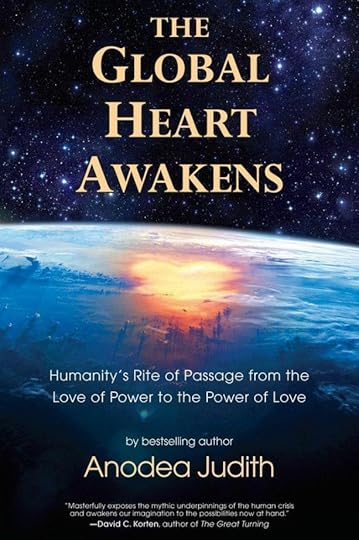 Following the line of the chakras, as I have done in THE GLOBAL HEART AWAKENS, it seems clear to me that it is the heart chakra with love as its organizing principle that will gradually replace competition with cooperation, move from a chain of command to a web of connection, shift from an ego system to an ecosystem, and mature from the unlimited growth of childhood to sustainability and spiritual growth.
Following the line of the chakras, as I have done in THE GLOBAL HEART AWAKENS, it seems clear to me that it is the heart chakra with love as its organizing principle that will gradually replace competition with cooperation, move from a chain of command to a web of connection, shift from an ego system to an ecosystem, and mature from the unlimited growth of childhood to sustainability and spiritual growth.
As governments fail or become corrupt, people grow up and take matters into their own hands. As the government shutdown cost the economy $12.5 million/hour or $24 billion dollars in total (nearly enough to end hunger worldwide, estimated at $30 billion), common citizens rolled up their sleeves to help each other out. Here’s a clip from Geri Weis-Corbley’s wonderful Good News Network about the power of love showing up when the love of power fails to provide what is necessary.
While you’re at it, give some support to the Good News Network in general and you will get weekly bulletins that will warm your heart and give you hope about humanity’s deepest trends toward the good.
Anodea Judith
October 24, 2013
September 6, 2013
Are We Syrious?
ARE WE SYRIOUS?
Avoiding the Monkey Trap of War in the Middle East
Having written about awakening the global heart, and its importance to our future, I can’t remain silent on the subject of Syria. Here lies a very thorny world problem, one much larger than the country itself, as it lies in the midst of a tinderbox of turmoil, trauma, and tension. Yet, that fact makes it even more essential that we carefully measure our steps and think forward into the future.
As I hear the media revving up the war drums once again, I feel like I’m in a déjà vu movie, another Groundhog Day, a replay of the wars in Iraq and Afghanistan. I am equally reminded of how both of those endeavors turned out. More money spent than the cost of solving every environmental problem on the planet, hundreds of thousands of people dead or maimed (or more), and those countries left with a traumatized population that continues to perpetuate tribal warfare and chaos, with even more openings left for rogue factions, such as the Taliban or Al Queda to prosper and take hold. Given the volatile conditions of the Middle East in general, a “surgical strike” on Syria is like throwing matches into a pile of rags soaked in Middle East oil.

Photo courtesy of FreedomHouse
All wars start with some kind of provocation, either real or manufactured. Whether the atrocities committed there are heinous enough to do something in Syria isn’t the point. Over 100,000 people have already been killed there since the uprising, and only recently have chemical weapons been used, and it is not yet clear exactly who used them, anymore than it’s clear who will suffer if we strike.
Granted the sight of children lined up in body bags is nothing less than atrocious, but will “punitive measures” make any difference? Since ancient times, Syria has been known for some of the most violent and brutal abuses of power of any tribe on the planet. Ancient Syrian kings blinded their slaves. Their armies were fearless and ferocious. It seems to be in their blood.
So what should we do? Stand back and do nothing while more innocent people are slaughtered? Or take military actions resulting in more innocent people being slaughtered? Either way, brutality and trauma are visited upon the Syrian people. And that trauma only perpetuates what we are trying to stop.
It is time for world cooperative action. It is time for the world to express its outrage. It is time for the Arab nations to stand up to their own and demand humane behavior of their neighbors. It is time for the more mature world powers to demonstrate that maturity with surgical peace talks, economic sanctions. It is time for the U.S. to lead with appropriate and clever diplomacy, setting the example of a peaceful and successful democratic nation. We can and must find another way. But we need not remain silent or passive.
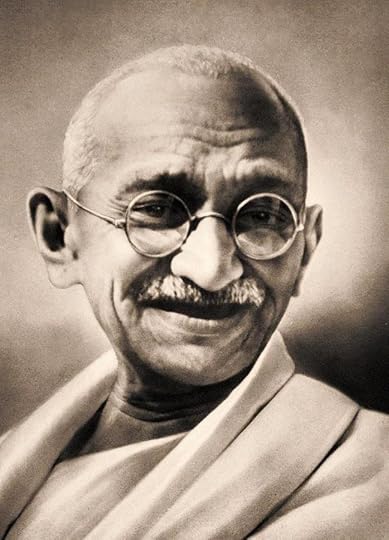 It is time for all of us to be outraged by violence. It is time to take it off our TV programming, remove it from the front page of the newspaper or the lead stories of anchor news. It is time to walk out of movie theatres with violent previews or movies and demand our money back (If you walk out within 20 minutes of the movie’s start, they will refund your money. I’ve done it numerous times in protest of violence).
It is time for all of us to be outraged by violence. It is time to take it off our TV programming, remove it from the front page of the newspaper or the lead stories of anchor news. It is time to walk out of movie theatres with violent previews or movies and demand our money back (If you walk out within 20 minutes of the movie’s start, they will refund your money. I’ve done it numerous times in protest of violence).
Gandhi said, “The force generated by non-violence is infinitely greater than the force of all the arms invented by man’s ingenuity.”
Bombing is not the answer. We can use our ingenuity to demonstrate another way. But we, ourselves, must start living the change we wish to see.
For a couple of good articles on Syria, check out these from Yes! magazine:
http://www.yesmagazine.org/peace-justice/eleven-reasons-why-we-should-not-attack-syria
http://www.yesmagazine.org/peace-justice/syria-lamp-in-the-storm
Anodea Judith
September 3, 2013
September 1, 2013
SHARING, a new way of handling resources
[image error]Few of you know her, but my behind-the-scenes assistant, Shanon Dean-Milon, is an amazing woman. Not only does she run many of the administrative tasks at Sacred Centers, as well as create graphics, maintain the website, and much, much more, she is also an avid gardener with a very green thumb. In the five or so years that she has worked for Sacred Centers—whenever we have a meeting—she shows up with a basket of tomatoes, zucchinis, eggs, or berries—as a gift, all from her backyard farm.
Yesterday as I passed by the “Shanon box” in the kitchen, teeming with fresh tomatoes, cucumbers and summer squash, I thought about how people used to naturally share their crops with each other. After all, how many zucchinis can we eat before they go bad? How many tomatoes can we handle before they are coming out our ears? It seems that nature, in producing so much at once, has designed it so that we must share. Somehow, in our supermarket packaging of individual items, we forgot what that was like.
But no longer. As I mention in the economic section of THE GLOBAL HEART AWAKENS, "We are developing more cooperative and collaborative means of sharing resources, and this in turn cuts down on the use and pollution of those resources, while allowing people to come together in community, and cuts down on cost for individuals."
Today, there are movements afoot to share cars, bicycles, home schooling, software (shareware), information, food, real estate, lawnmowers, money, and much more. It is forming a new subterranean economy, a low hum against the din of the larger world’s economic system of self-interest and greed. I highly recommend this article by Neal Gorenflo from the Kosmos Journal, describing how the sharing economy works for us all. Thank you, Neal, for inspiring this blog!
Love and Blessings,
Anodea
P.S. We have lots of great workshops coming up, both in the US and abroad! Check our full calendar for listings near you.
June 3, 2013
New York State of Mind
So here I am in the Big Apple, attending the BEA-America’s largest Book Expo, along with tens of thousands of other authors, publishers, agents, bookstore owners, media, and book lovers in general. Walking through these halls with its millions of books and endless displays is enough to deter me from ever writing a book again. Does the world really need another book, I wonder?
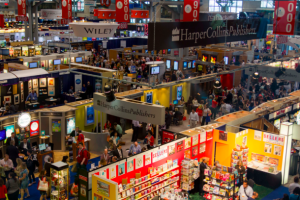 A majority of the titles I see are self-help books: how to become richer, prettier, slimmer, sexier, smarter, empowered, enlightened, or electronically connected. It is a huge mass of information catering to the egos of individuals. Like any marketplace, each vendor is trying to be seen, each author wanting to be noticed, each reader looking for something that might make their lives a little better.
A majority of the titles I see are self-help books: how to become richer, prettier, slimmer, sexier, smarter, empowered, enlightened, or electronically connected. It is a huge mass of information catering to the egos of individuals. Like any marketplace, each vendor is trying to be seen, each author wanting to be noticed, each reader looking for something that might make their lives a little better.But what is it all for?
At the end of the day, I have dinner with my publicity agent, Eileen Duhne. We walk through Times Square and witness its “screaming cacophony of electronic narcissism,” as writer Thomas Homer Dixon puts it. Each business is flashing its individual lights as if to say, “Come look at me, Buy from me, Eat here, See this.” Thousands of individuals from all walks of life, all races, genders, ages, sizes, nationalities, sexual persuasions, and socio-economic status throng along the street, beckoning to the call, with the innocent agenda of just looking for a good time.
But what is it all for?
I think of the single-celled organisms that spread across the earth in teems of microbial mats for nearly 3 billion years before they finally figured out how to overcome their individuality and combine forces. After that, creativity was unstoppable. In the next ten million years, (which is only .3% of that time) we had our first multi-celled creatures, and less than a billion years later, humans with opposable thumbs were thronging through Times Square on a Friday night in New York, a teeming mass of 8.245 million people.
 I look at the lights and imagine what would happen if we were able to coordinate all that energy and focus into a unified purpose: to make incredible beauty, to create heaven on earth, to demonstrate majesty, to allow us to see our true capacities as humans, gifted as we are with the ability to create almost any reality we want.
I look at the lights and imagine what would happen if we were able to coordinate all that energy and focus into a unified purpose: to make incredible beauty, to create heaven on earth, to demonstrate majesty, to allow us to see our true capacities as humans, gifted as we are with the ability to create almost any reality we want.We have enough energy, technology, creativity, and power to correct all the wrongs in this world: all our environmental problems, world hunger, overpopulation, global warming. We can reforest the planet for less than what Americans spend on ice cream in a single year; we can end world hunger for a portion of what we spend on diet and fitness; we can solve everything for a fraction of what we spent on the Iraq war. We just don’t know how to channel it into collective good. We have not yet matured into the coalescence of consciousness that allows us to see the magnificence we could create if we work together and look at the bigger picture.
We have not yet seen that making a world that works for all, makes a better world for each of us. It transcends our individual needs, turns the world green again, makes us healthy, lowers crime, and surpasses any expectations we might have. It gives us more than we could possibly have on our own.
Look at the most elaborate operating system, Linux, made by collaboration. Consider the most extensive encyclopedia of information, Wikipedia, which I’ve already accessed several times in writing this blog. Look at all that we have already made: elaborate cities, a world transportation system, feeding almost seven billion people (not all are fed well), peace among most nations, and greater freedom and power than humans have ever had before.
This is the theme of the global heart’s awakening, the book I am here to bring to the world. Tomorrow I will line up with hundreds of other authors, facing lines of strangers, giving out autographed copies. Maybe they’ll read it, maybe they just want to re
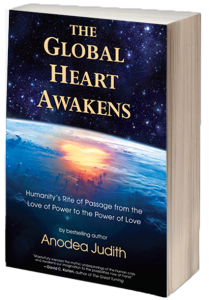 sell it on Amazon. I will have 30 seconds to look into their eyes and wonder if they can imagine a world ruled by the heart, by the best of our human potential, through the fruits of all the self-help books ever written, by the immense creativity, cooperation, peace, and prosperity we are capable of creating.
sell it on Amazon. I will have 30 seconds to look into their eyes and wonder if they can imagine a world ruled by the heart, by the best of our human potential, through the fruits of all the self-help books ever written, by the immense creativity, cooperation, peace, and prosperity we are capable of creating.I hope that I can seed this vision. It is very big. It has many pieces. I don’t know exactly how we get there. But I know that it is coming. The more we start to look in that direction—to the future picture of creating heaven on earth—the sooner we bring it about.
Love and blessings,
Anodea Judith



